|
|
| Sei in: Cinema e Medioevo ® Indice alfabetico dei film |
Suleiman the Magnificent
(Muhtesem Yuzyil)
2011, regia di Yağmur Taylan, Durul Taylan
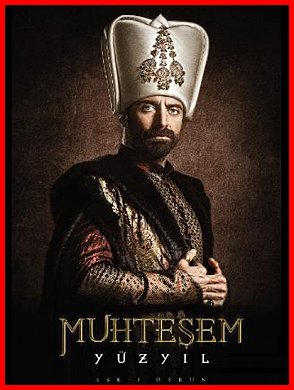
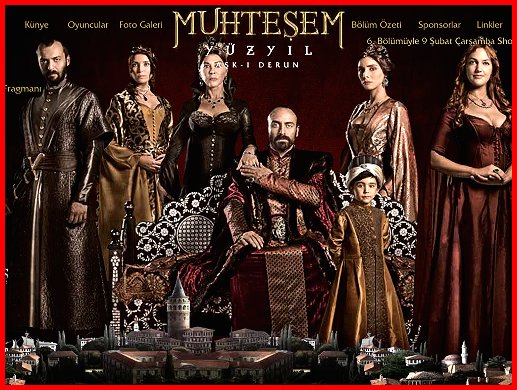
Scheda: Nazione: Turchia - Produzione: Tims Production - Distribuzione: Show TV - Soggetto: Meral Okay - Sceneggiatura: Meral Okay - Formato: Color, serie tv in 4 episodi - Durata: 90' ogni episodio.
Cast: Halit Ergenç, Meryem Uzerli, Nebahat Çehre, Okan Yalabık, Nur Aysan.
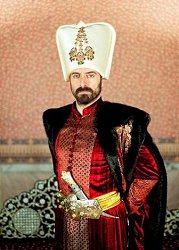
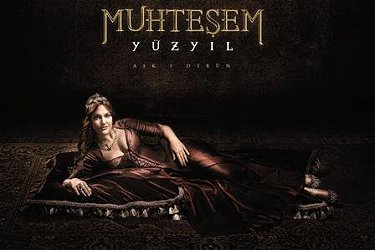
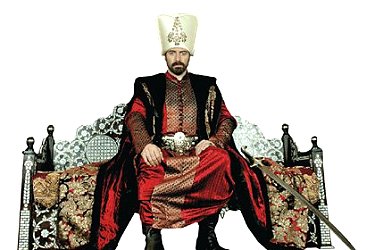
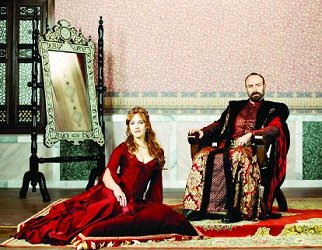
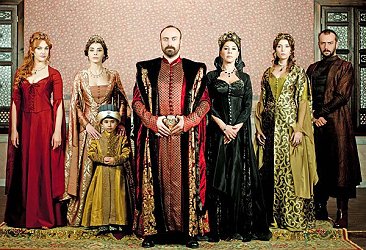





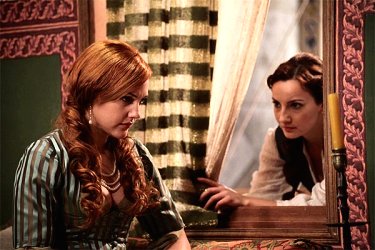
![]() Trama e commenti:
repubblica.it -
blitzquotidiano.it: «The
Magnificent Century è una serie tv dedicata a Solimano il Magnifico andata in
onda sulla tv turca Show Tv. La fiction ha però scatenato una serie infinita di
proteste: il sultano che ha regnato più a lungo durante l’impero ottomano appare
infatti come dedito alle sue concubine più che all’impero e irrispettoso del
sacro divieto di non bere alcol, nonostante come Califfo rappresentasse la più
alta autorità religiosa.
Dopo la prima puntata trasmessa, il Supremo Consiglio per la Radio e la Tv ha
ricevuto 75mila lamentele di spettatori indignati per la rappresentazione
“indecente” ed “edonista” della dinastia ottomana.
Il caso ha scatenato anche reazioni politiche. “Seicento anni di impero non sono
stati costruiti sull’harem”, ha detto Suat Kiliç, il capo dei deputati del
partito di governo, AKP. Le formazioni più nazionaliste sono scese in piazza,
con un sit in vicino al mausoleo di Solimano, adiacente alla moschea che porta
il suo nome, una delle più imponenti di Istanbul.
Un altro gruppo ha protestato tirando uova contro l’edificio dell’emittente
televisiva. Anche il vice primo ministro Bülent Arinç ha espresso
“preoccupazione e tristezza”, promettendo l’intervento del governo».
Trama e commenti:
repubblica.it -
blitzquotidiano.it: «The
Magnificent Century è una serie tv dedicata a Solimano il Magnifico andata in
onda sulla tv turca Show Tv. La fiction ha però scatenato una serie infinita di
proteste: il sultano che ha regnato più a lungo durante l’impero ottomano appare
infatti come dedito alle sue concubine più che all’impero e irrispettoso del
sacro divieto di non bere alcol, nonostante come Califfo rappresentasse la più
alta autorità religiosa.
Dopo la prima puntata trasmessa, il Supremo Consiglio per la Radio e la Tv ha
ricevuto 75mila lamentele di spettatori indignati per la rappresentazione
“indecente” ed “edonista” della dinastia ottomana.
Il caso ha scatenato anche reazioni politiche. “Seicento anni di impero non sono
stati costruiti sull’harem”, ha detto Suat Kiliç, il capo dei deputati del
partito di governo, AKP. Le formazioni più nazionaliste sono scese in piazza,
con un sit in vicino al mausoleo di Solimano, adiacente alla moschea che porta
il suo nome, una delle più imponenti di Istanbul.
Un altro gruppo ha protestato tirando uova contro l’edificio dell’emittente
televisiva. Anche il vice primo ministro Bülent Arinç ha espresso
“preoccupazione e tristezza”, promettendo l’intervento del governo».
![]() Plot Summary, Synopsis, Review: en.wikipedia.org
-
showtvnet.com
-
balcanw.com
-
facebook.com
-
tims.tv -
istanbulview.com
-
muhtesemyuzyildizisiizle.com
-
hurriyetdailynews.com
-
preferredbypete.com
-
economist.com:
«Sultan Suleiman the Magnificent, who earned his moniker for taking the
Ottoman empire to the apogee of its glory in the mid-16th century, is widely
regarded as sacred in Turkey. No matter that he had his own son murdered, among
several dastardly deeds. Modern Turks like to boast of his armies reaching the
gates of Vienna and to refer to him as the “lawgiver”. A British historian,
Jason Goodwin, writes that Suleiman was “majestic enough to stock his court with
an unusual number of buffoons, dwarves, mutes, astrologers, and silent
janissaries” and that he ruled so long “that he became something of an Ottoman
Queen Victoria.”
In recent weeks Suleiman has been at the centre of a new row that pits secular
Turks against Muslim conservatives. The cause was a televised drama series,
replete with scenes from the royal baths and the harem, which chronicled
Suleiman’s military and sexual exploits. Pious Turks were incensed by scenes of
Suleiman lusting over his most coveted queen, Roxelana, and drinking goblets of
wine.
Bulent Arinc, deputy prime minister in the mildly Islamist Justice and
Development (AK) government, called for the series to be scrapped. “It shows him
in his harem, fond of drinking and in certain scenes that I cannot find words to
express,” Mr Arinc complained. Halit Ergenc, who played Suleiman, was inundated
with hate mail and death threats.
The state media watchdog, RTUK, says that it has received a record number of
complaints about the series. It even issued a warning to the channel responsible,
Show TV, that it was clashing with the “national and moral values of our
society”. Members of the overtly Islamist Saadet party, chanting Allahu akbar
(“Allah is great”), staged protests outside Show TV’s headquarters in Istanbul.
Yet, as Meral Okay, one of the scriptwriters, commented, “the children of the
Sultan were not conceived by pollination…he did have a sex life and a family.”
At least the controversy boosted the show’s ratings to record heights.
Fervent Islamists tout the Ottomans as the antithesis of Ataturk, who abolished
both the Sultan and the caliphate. Moreover, in his last years Suleiman turned
religious. Mr Goodwin writes that Suleiman “dined off earthenware platters, and
fostered the triumph of Orthodox Islam…but when the Austrian ambassador took
leave…it was scarcely a living being he described but a metaphor of empire
rotting and majestic, fat, made up, and suffering from an ulcerous leg.”».
Plot Summary, Synopsis, Review: en.wikipedia.org
-
showtvnet.com
-
balcanw.com
-
facebook.com
-
tims.tv -
istanbulview.com
-
muhtesemyuzyildizisiizle.com
-
hurriyetdailynews.com
-
preferredbypete.com
-
economist.com:
«Sultan Suleiman the Magnificent, who earned his moniker for taking the
Ottoman empire to the apogee of its glory in the mid-16th century, is widely
regarded as sacred in Turkey. No matter that he had his own son murdered, among
several dastardly deeds. Modern Turks like to boast of his armies reaching the
gates of Vienna and to refer to him as the “lawgiver”. A British historian,
Jason Goodwin, writes that Suleiman was “majestic enough to stock his court with
an unusual number of buffoons, dwarves, mutes, astrologers, and silent
janissaries” and that he ruled so long “that he became something of an Ottoman
Queen Victoria.”
In recent weeks Suleiman has been at the centre of a new row that pits secular
Turks against Muslim conservatives. The cause was a televised drama series,
replete with scenes from the royal baths and the harem, which chronicled
Suleiman’s military and sexual exploits. Pious Turks were incensed by scenes of
Suleiman lusting over his most coveted queen, Roxelana, and drinking goblets of
wine.
Bulent Arinc, deputy prime minister in the mildly Islamist Justice and
Development (AK) government, called for the series to be scrapped. “It shows him
in his harem, fond of drinking and in certain scenes that I cannot find words to
express,” Mr Arinc complained. Halit Ergenc, who played Suleiman, was inundated
with hate mail and death threats.
The state media watchdog, RTUK, says that it has received a record number of
complaints about the series. It even issued a warning to the channel responsible,
Show TV, that it was clashing with the “national and moral values of our
society”. Members of the overtly Islamist Saadet party, chanting Allahu akbar
(“Allah is great”), staged protests outside Show TV’s headquarters in Istanbul.
Yet, as Meral Okay, one of the scriptwriters, commented, “the children of the
Sultan were not conceived by pollination…he did have a sex life and a family.”
At least the controversy boosted the show’s ratings to record heights.
Fervent Islamists tout the Ottomans as the antithesis of Ataturk, who abolished
both the Sultan and the caliphate. Moreover, in his last years Suleiman turned
religious. Mr Goodwin writes that Suleiman “dined off earthenware platters, and
fostered the triumph of Orthodox Islam…but when the Austrian ambassador took
leave…it was scarcely a living being he described but a metaphor of empire
rotting and majestic, fat, made up, and suffering from an ulcerous leg.”».